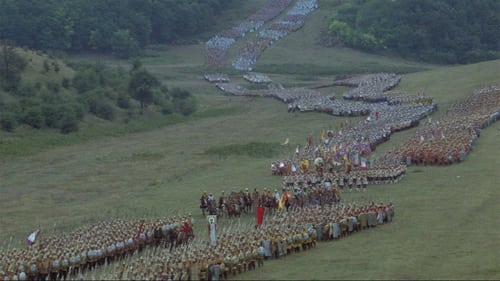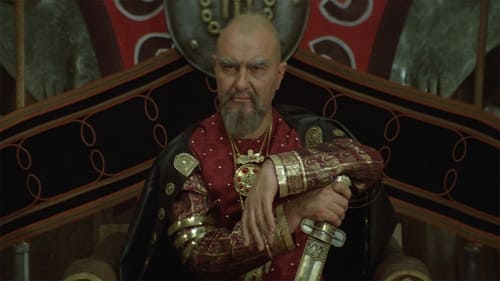Stefan Getsov
Birth : 1932-07-03, Maglizh, Kazanlak, Bulgaria
Death : 1996-09-10

The High Priest of Tangra
The last part of the epic "Khan Asparukh" - "Land Forever" is an impressive finish to scale narrative, created for the nationwide celebration of 13 century anniversary of the Bulgarian state. The authors collected in final chord all storylines, culminating in the political strengthening of the young Bulgarian state. In the center of the film epic again is the image of Khan Asparukh - a lofty romantic hero who embodies the virtues and energy of his people.

The High Priest of Tangra
This is an epic screen presentation showing the creation, the consolidation and the power of First Bulgarian Kingdom and the first Bulgarian ruler Khan Asparuh. The second part of the great historical epic - "The Migration" - tells about the long journey to the land of the Bulgarians of today's Bulgaria. Here the young Khan Asparukh laid the foundations of the new state. The authors adhere to the established historical versions for this event. The film builds on the impressive mass scenes and the convincing served psychological characteristics of the main characters. The image of Asparoukh is a natural center of the story, in which many minor persons recreate the environment of the Khan. Romantic exalted, Asparukh is shown as capable leader of the people, consistently implement his own ideas.

The High Priest of Tangra
This is an epic screen presentation showing the creation, the consolidation and the power of First Bulgarian Kingdom and the first Bulgarian ruler Khan Asparuh. This is the first part of the film trilogy about the events before the creation of the Bulgarian state in the middle of the VII century. Volga Bulgaria is straining under the attacks of the Khazars. Following the testament of his father, the sons of Khan Kubrat looking for a new home for their tribes. The youngest of them - Asparukh, wander 20 years in search of "land forever" for his people and reaches the mouth of the Danube. The film is narrated by captured Byzantine chronicler Belisarius, which should Asparukh in his journeys. Byzantine witnessed the heroic efforts of the Bulgarians to win the land south of the Danube and to create their new country.

In 651, Khan Kubrat died and the Khazars accelerated their raids upon Great Bulgaria. His five sons split the Bulgarian tribe and each led his to find new land where they could live in peace. Khan Asparukh, the youngest son, went west and, after an arduous journey lasting for years, southward across the River Danube, into Moesia. In 680-81, in alliance with the Slavs, he inflicted stunning defeats on the Roman legions and forced the Byzantine Empire to recognize the formation of the new state of Bulgaria in the lands where it still exists today.

Georgi Dimitrov

Popeto, the villagers chairman
Bulgaria in the 1950's. The agriculture in the country goes after the communist model. In one village, there is a man who refuses to join the cooperative and opposes the despotic local leader.

Georgi Dimitrov
This is a political picture about the Bulgarian revolutionary Georgi Dimitrov. In 1933 during the Reichstag Fire Trial trumped-up charges of having set the Reichstag on fire were brought against him. At the trial Dimitrov exposed the machinations of the Nazis and turned from a defendant into an accuser. Central to the story is the face-to-face political duel between Dimitrov and Goering. Dimitrov's interactions with ordinary Germans, the memories of his wife Lyuba Ivoshevich, and the meetings with his mother Parashkeva alternate with documentary shooting scenes from the time of Nazi Germany.

Samotniya
The action takes place at the end of WWII. It is 1944 on the Yugoslav front, where the Bulgarian Army is fighting bloody battles against the retreating Nazi units. Several lorries loaded with Bulgarian soldiers make a detour so as to deliver ammunitions to an army unit. They are people with different convictions sharing a common goal - to come out victorious and to return to their peaceful everyday life. Among them are people who believe in the triumph of the new system and for whom the difficult crusade is a confirmation of their ideals. They are also uncertain people. For the youngest this is the first trial in life. A young Yugoslav woman helps them find the road through the dangerous front line. Her romance with the one of Bulgarian soldiers symbolizes solidarity in the struggle against the common enemy. After a series of difficulties and mishaps, the soldiers manage to deliver the ammunitions to their comrades.

Strahil is a leader of a rebel band. The Turkish governor abducts beautiful girl Ivana for his harem. The outlaws hold the governor's child to ransom. The governor promises to Strahil neither to attack the peasants, nor to persecute them if he settles down to a peaceful life. Together with Ivana Strahil goes back to his father house... One day a group of people, driven by Turkish soldiers on their way to do forced labor, passes by Strahil house. Women and children wail. Strahil rushes at a soldier and kills him. There is an exchange of fire: Ivana is helping him. A large number of mounted troops surround Strahil's house. His band hurries to the village. Ivana hides in the cellar and fires. She hits the Turkish governor. The rebels rescue Ivana. The governor rises in a last effort and fires at Ivana. Dying Ivana manages to tell Strahil that she wants him to bury her in their favorite glade and return to the band. Strahil raises his hand to take an oath over Ivana's dead body.

Kerim
The weaknesses and shortcomings in the work of some leaders in the years of the building of socialism are ridiculed.







